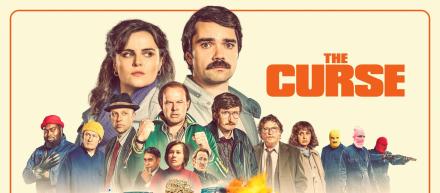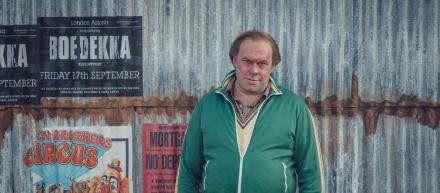
The Curse is a comedy caper set in London in the early 1980s, following a gang of hopeless small time crooks who through their own stupidity and poor judgement find themselves embroiled in one of the biggest gold heists in history.
The Curse stars Tom Davis (Murder in Successville, King Gary), Steve Stamp (People Just Do Nothing), Allan Mustafa (People Just Do Nothing), Hugo Chegwin (People Just Do Nothing), Emer Kenny (Pramface, Beaver Falls), Peter Ferninando (The Letter for the King), Ambreen Razia (This Way Up), Geoff Bell (His Dark Materials) and Michael Smiley (Luther).
Sundays at 10pm, C4 from February 6
What was your inspiration for creating The Curse?
James and I had spoken for a long time about doing something in the gangster crime genre. At one point, we discussed doing something set around Hatton Garden, but suddenly everyone was doing that. Meanwhile, I got to know Allan Mustafa and we were talking about doing something. They won a BAFTA in 2017, then we won the following year (for ‘Murder in Successville’), so we ended up hanging out at the same parties. That friendship grew and it felt like we could do something with this. The story’s so rich. I’ve always been obsessed with that world. The first character James and I ever did together was an old Krays-type fella; telling stories as he walked around London. As the series goes on, you realise what a big part of that society criminals were.
Is the story still relevant today?
The 80s killed off the working classes in many ways, so these characters are like dinosaurs in a world that’s been hit by a meteorite of commercialism. It’s nearly 40 years ago, but seems more relevant now than ever before. As a country, we haven’t learnt or moved on. It was eye-opening researching that era. It really resonated with me.
Tell us a bit about your character, Mick?
King Gary is the first time I’ve played someone similar to myself, so as a character comedian, I relished getting to play Mick. I wanted to push him as far as I could. It was important that the big man within the group shouldn’t just be a bully; there needed to be more to him than that. All these characters go on a journey. Mick’s almost like a big sister who looks out for everyone. He cares about friendship and family. There’s a moral compass there but he’s quite a lonely guy in some ways. He’s also slightly older than the rest of the group, which is something Seapa reminded me of all the time.
Yes, the others said you were the only one old enough to remember the 80s.
What I love is there’s three years between most of us. It’s clearly a big fucking three years. I’m only 42, so I was a kid during the 80s, but from the recollections I have up to age 10, this is pretty bang-on.
How did you come up with Mick’s extraordinary voice?
I spent a lot of time working on a voice that was completely different to anything I’d done before. It’s based on people I grew up with. These storytellers who spoke in the Queen’s English and tried to sound more intelligent than they were. I also knew a lot of travellers when I was younger, so there’s a tinge of that accent too. Mick’s look was so important. I attribute 50% of that to Jody Williams, our hair and make-up designer. Mick’s our ‘child’, essentially.
Tell us about his clothes too?
He only has one costume. We decided early on that it’s hard enough nowadays as a bigger guy to find clothing, so in 1982, it’d be nigh-on impossible. Once you had a pair of trousers, they were your trousers. The other characters all have a few changes of costume but Mick pretty much has this one tracksuit top, which you find out a bit more about mid-series. There are hidden layers to Mick. A few subtle things to look out for. I can’t say much more because of the people he’s based on but keep an eye on him.
Did you enjoy all the Cockney slang in the show?
I’ve always been obsessed with the English language and ways of talking, across everything I’ve done - from stand-up to King Gary to my podcast with Romesh Ranganathan [Wolf & Owl]. The beauty of playing Mick is that you can say almost anything. (Slips into the voice) “You treated me like a lady’s underpiece in that situation.” Anything can sound Mick-esque in the right context. The slang became organic. Nobody was precious about the script. If there was a funnier way of saying something, we’d go with it.

The others say you were just trying to make them laugh and knew exactly what you were doing…
Yeah but the danger is I’d make myself laugh first. They’re seriously talented guys. When I first saw People Just Do Nothing, I went “Wow. I’d have loved to have been involved in that.” So to spend the last four years working together on this idea was a treat. Writing it during the pandemic, we all kept each other sane. Hugo is wildly underrated as an actor. He’ll go as far as he wants to go in this business. Steve Stamp as a writer and performer is wonderful. Allan is a leading man who carries the show. And lot of credit goes to Emer Kenny. The show was always going to live or die on finding someone who could become ‘Tasha - strong and funny at the same time. Emer came in and smashed it. She comes from a similar background to us, got the tone of our banter and was just a joy to be around. And a shout-out to Abraham Popoola, who plays Big Joey. He’s a phenomenal talent.
Tell us a bit about the other supporting cast?
We wanted the best actors to come in and play the proper gangsters so the threat is real, as opposed to us fools and idiots. Peter Ferdinando is terrifying as ‘Crazy Clive’.
And later in the series, there’s Michael Smiley too?
I’m very emotionally linked to Michael. I’ve known him a long time. I gigged with him 13 years ago and died on-stage. It was truly terrible and I came close to quitting comedy. Michael was on the same bill and he called me the next morning, took me out to lunch and spent the day giving me notes, talking me through how to become a better stand-up. He got me a gig that night at the Comedy Store, the first time I’d ever played there. I used the tricks I’d learnt from Michael and absolutely smashed it. He set me on the right path. So it was a humbling moment when he came on-set. A little way of repaying the debt.
What were your touchstones when it came to writing The Curse?
Early on, we decided we didn’t want to spend five episodes of six discussing doing the robbery. We wanted to get it out of the way early. The robbery is almost the easy bit, especially back then. The hard part comes afterwards. I’m old enough to remember my dad losing his job and my mum - who was a nurse for years - worrying about money. I know how hard this world can be. Given those circumstances, would you do something if it seemed like easy money and you thought you could get away with it? None of these guys are proper criminals. They’re on the fringes of crime, only because they have to be. So we read up on true crimes: British, American, Spanish ones. Look at Money Heist on Netflix - it’s incredible but the smallest element is the robbery. Touch wood we get a chance to come back to The Curse to find out where these guys end up, what it does to their friendships and families.
There’s a high level of detail in the show, isn’t there?
It’s a labour of love and that’s all down to James De Frond. I’ve known James since I was 14. He’s not just the best director I’ve seen in terms of working with actors but his eye for everything is incredible. Us lot come in, create the characters and write the scripts as an ensemble but he’s above us all, like the conductor. He gets the whole cast and crew playing from the same sheet. The show is testament to his talent, as well as people like Roy Estabrook [director of photography] and Anna Sheldrake [production designer]. As actors, we’re only a small fraction of it. The people who make 1982 London believable in 2021 Liverpool - they’re the ones you want to do justice.
Are you proud of The Curse?
Very. It reminds me of when we first came up with ‘Murder In Successville’, trying to break and remake the wheel. After three years of making King Gary with those mainstream sensibilities, this feels like something completely different. It’s been four years in the making, from initial chats to where we are now. Obviously two of those years were due to pandemic but I’m very proud. I watched it back and genuinely thought: “you’ve done alright there, son.”
What do you hope the reaction will be?
I hope people understand what we’re trying to do. I have a bit of a chip on my shoulder about working-class people being forced into a box. Every time we try and escape by doing something higher concept, we get told it’s not for us. So in the cold winter months that are coming, I hope people enjoy it. I think they will.
Interview supplied by C4



